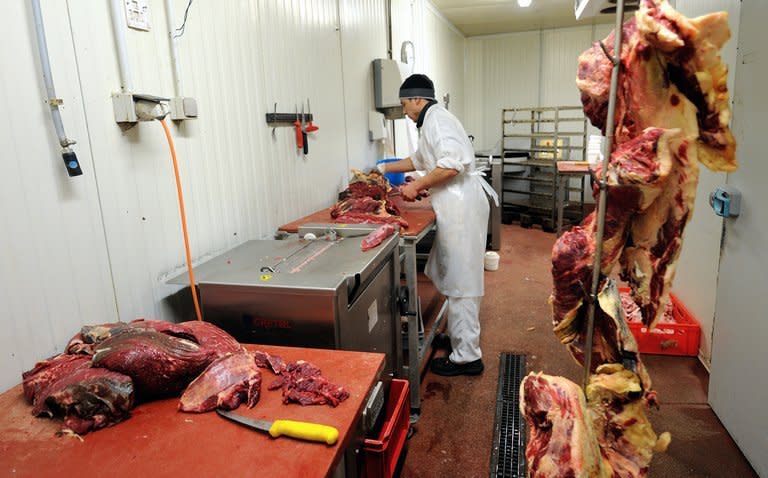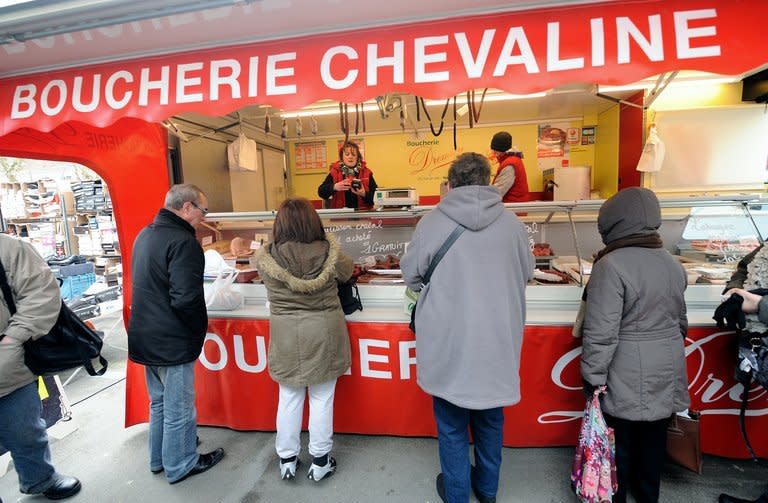France says drug-tainted horsemeat likely in food chain
Horsemeat containing a drug potentially harmful to humans has probably entered the food chain, France announced, as Italy became the latest country to be drawn into the contaminated meat scandal. In Germany meanwhile, a minister suggested giving products mislabelled as beef products but actually containing horsemeat to the poor. Several horse carcasses containing the drug Phenylbutazone have probably ended up being eaten by consumers, a French agriculture ministry spokesman told AFP on Saturday. Phenylbutazone is an anti-inflammatory treatment for horses which is potentially harmful to humans and so is banned for consumption. Britain alerted Paris that six tainted carcasses had been exported to France in January, but by that time the meat had already been processed. Agriculture Minister Stephane Le Foll said that although some of the meat had been recalled, the equivalent of three carcasses had "probably" made it to consumers. There was however "no health risk" since the traces of phenylbutazone found in the meat were "extremely weak", he added. Le Foll said this incident was not connected with the wider horsemeat scandal since the meat had not been disguised as beef. But the announcement nevertheless added a new dimension to the scandal. The row over mislabelled meat erupted in Europe in January after horsemeat was initially found in so-called beef ready-made meals and burgers in Britain and Ireland. Since then, supermarkets across the continent have pulled prepared meals from their shelves, with effects felt as far away as Hong Kong where an imported brand of lasagne has been withdrawn from stores. On Saturday Italy joined the long list of countries that have been hit by the fraud, reporting its first case of horsemeat-contaminated lasagne. Horsemeat was found in tests on six tonnes of mincemeat and 2,400 "lasagne bolognese" packages produced by a central Italian company that had used meat from suppliers based in the northern part of the country. The tests were carried out as part of checks by police on 121 brands across the country. In Germany, Development Minister Dirk Niebel suggested handing out mislabelled food products taken off the shelves because they contained horsemeat to the poor. "More than 800 million people are dying of hunger in the world," he told Saturday's edition of Bild newspaper. "And unfortunately in Germany there are also people for whom it is difficult financially, even for food... I think that we can't here in Germany throw away good food," he added. Labour and Social Affairs Minister Ursula von der Leyen however dismissed the idea as "absurd". French President Francois Hollande, speaking during a visit to an agricultural show in Paris on Saturday, said he would push for mandatory labelling of meat in ready-made meals. French firm Spanghero has been at the heart of the scandal after it allegedly passed off 750 tonnes of horsemeat as beef. The product eventually found its way into 4.5 million "beef" products sold across Europe. French authorities had initially suspended the company's sanitary licence, but following protests from 300-odd workers allowed the company to resume production of minced meat, sausages and ready-to-eat meals. The company was banned, however, from stocking frozen meat. In Ireland, authorities on Friday suspended production at a meat processing plant after investigators found it was selling horsemeat labelled as beef. B&F Meats, a small company licenced to debone beef and horsemeat in Carrick-on-Suir in County Tipperary, was found to be sending horsemeat to a customer in the Czech Republic, the Irish agriculture ministry said in a statement. The label in the Czech language refers to beef, it added.





